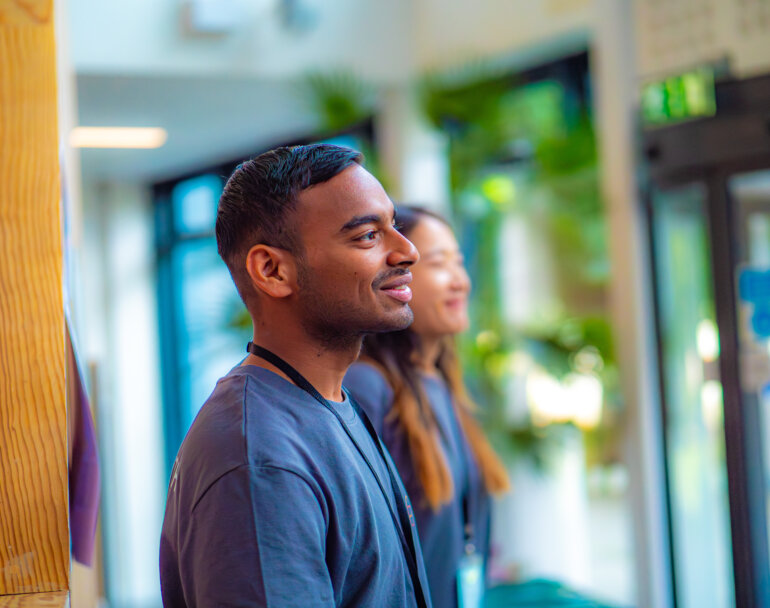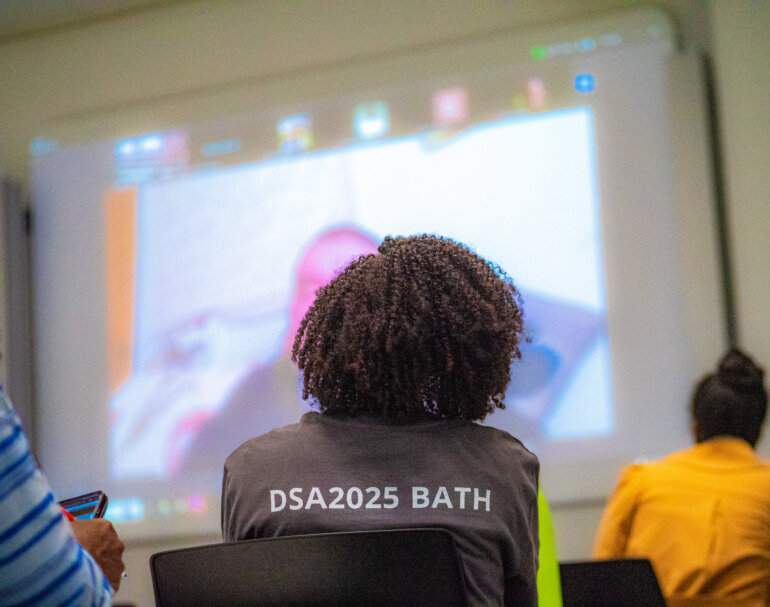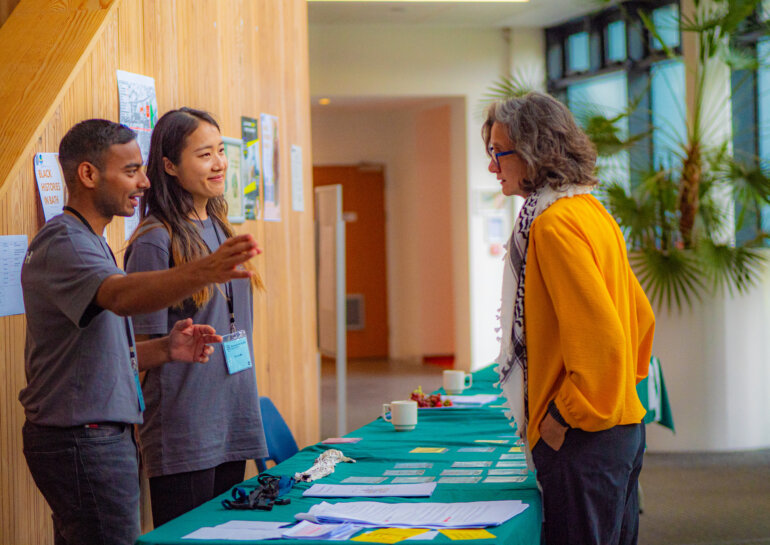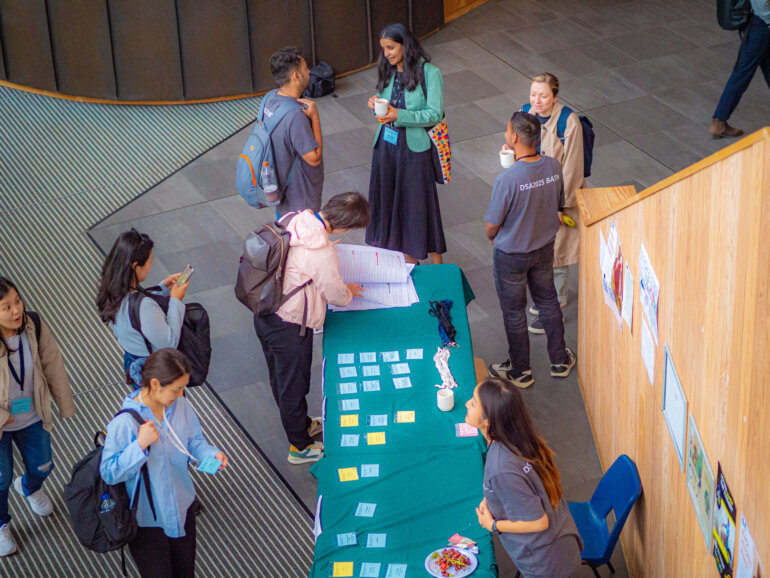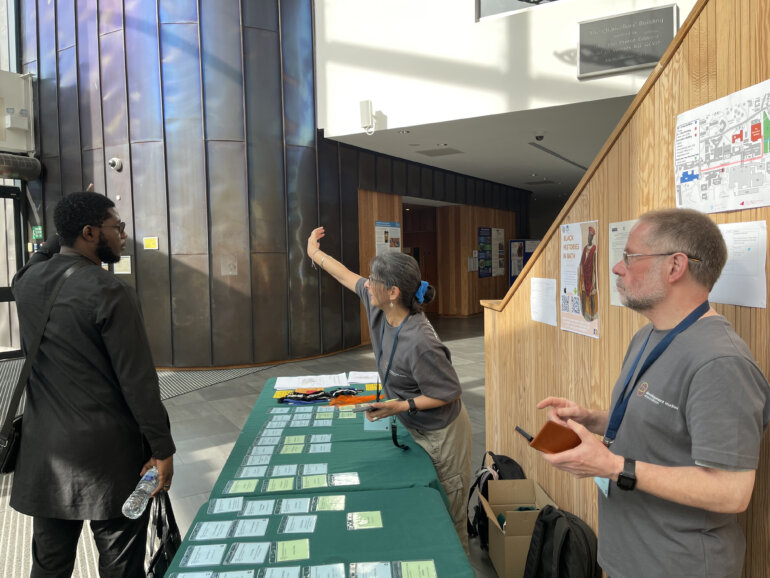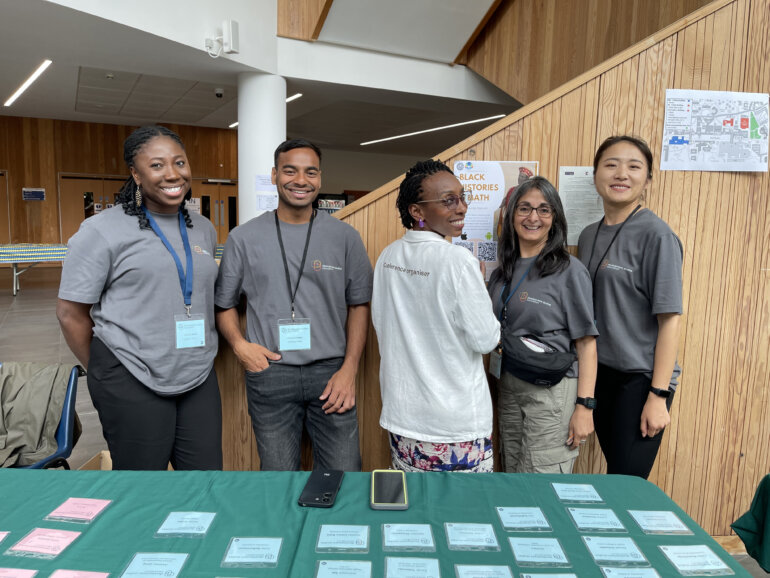Who are the DSA conference volunteers?
All of the delegates at DSA2025 came into contact with one of the smiling and helpful conference volunteers at the registration desk – especially those of you trying to find some of the hidden panel rooms – or when joining in online! You may have noticed some of those same volunteers later in the conference, without their conference t-shirts and presenting a paper or even in the discussion of a DSA panel. That’s because our DSA conference volunteers are recruited by the host university from their student body. CDS Bath went a step further this year to ensure there were plenty of volunteers to help a smooth running in-person and online experience by opening the volunteering opportunity to CDS alumni and undergraduates. The result was a fabulous mix of experience, insights, and languages to welcome conference delegates but also to take part in the conference. We got chatting to some of the 35 volunteers.
One of this year’s DSA conference volunteers, Pushpak Kolhe, is a current master’s student at the University of Bath, studying Sustainability and Management. For him, the opportunity to volunteer wasn’t just about lending a hand – it was about building a future in research.
“I’m looking to pursue a research career after my master’s,” Kolhe explained. “I saw volunteering at the DSA as a great way to make connections especially because the conference theme this year around sustainability and social aspects of humanity aligns closely with one of my areas of interest.”
The experience did not disappoint as Kolhe made new connections. “A lot of people were surprisingly also from the University of Bath but they were people I hadn’t met before. One of the highlights was meeting a professor from an American university, who works in my area of interest. We’re already connected on LinkedIn.”
Kolhe also appreciated informal moments, such as networking during the social events. “Even at the drinks reception, I met people from back home in India who are focused on similar topics I’d like to work in. It really felt like I was in the right place.”
In contrast to the more structured and hierarchical formats common in some academic cultures, the DSA conference’s inclusive environment gave new researchers the chance to interact informally with established scholars—a first for many.
Yachao Ma, from China, is now a master’s student in Business Analytics at the University of Bath. She volunteered at the conference to step outside the classroom and into a wider academic world.
“I think this kind of event is very meaningful for us,” she said. “All the days, we just study and do some research, but if we want to connect with more people, this kind of event, I think, is really good for us. There’s one part – just going to the social events – before I came here, I never did this before. So it was very new for me to go there and talk with people. At the beginning, I didn’t even know how to start it, so I just followed [another volunteer ] and he taught me how to ask questions,” she said with a laugh. “I just think it’s very interesting. I love this kind of thing to meet with people, to make more friends.”
Being at an academic conference, Ma admitted, initially felt a bit intimidating. “The people here, I think they’re very professional – they’re doing PhDs or they’re professors. I never imagined I could have this kind of chance to join this kind of environment.”
Gordon Thompson, an alumnus of the University of Bath who completed his master’s in Humanitarianism, Conflict and Development, saw the DSA conference as a timely stepping stone before starting his PhD in polycrisis at the University of Leicester.
“I’ve never been to an academic conference but I thought, let’s go and try an academic conference,” he said. “Obviously, start to meet people and all the rest in the relevant field.”
What stood out most was the insight into academic life itself. “It’s interesting, learning about the process of going into real niche questions,” he explained. “I’ve picked up quite a lot in terms of the process from people who are studying PhDs now. That’s been the big factor which is an important part for me. I’m only two months into my PhD!”
Priti Chotai, also an alumni, did her masters at Bath in humanitarian conflict and development. She says conferences like this are important for connections, as she described her own unconventional path into the sector, which began with volunteering abroad and evolved into a lasting career fueled by passion and persistence.
“Keep in touch. Keep in touch with your colleagues, keep in touch with what they’re doing, but also keep in touch with maybe jobs or even volunteer jobs that are going on in your community. You know, there’s so much that can be done.”
We’re delighted that DSA2025 provided a great place for renewing and making new connections and we are grateful to all the volunteers for being an important part of a successful conference.
